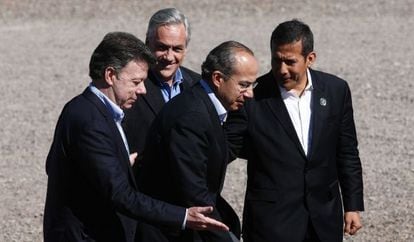Four nations forge powerful Pacific Alliance trade bloc
Presidents of Chile, Colombia, Peru and Mexico sign new economic agreement Leaders want to establish trade links with Asia and other pacific nations


The presidents of Chile, Colombia, Peru and Mexico signed an agreement on June 6 forging a new economic bloc called the Pacific Alliance, which aims to challenge other regional groups, such as Mercosur, the Andean Pact and the leftist Bolivian Alliance of the Americas (ALBA).
The leaders of the countries that comprise the new integration pact say they want to set up trade links with Asia and other nations in the Pacific.
With a combined population of 215 million and GDP of $2 trillion, the new bloc ranks as the ninth economy in the world, on the same scale as Italy.
"It is the most important integration process of Latin America," said Colombian President Juan Manuel Santos, who played down suggestions that the new alliance would strongly compete with other blocs. "It is not an exclusive group and will be open to other countries," he said.
Few candidates
But only Costa Rica, which announced its intentions to join, and Panama, have been given observer status. Ecuador, situated in the middle of the Pacific Alliance nations, and which is led by fiery leftist Rafael Correa, was conspicuously absent from last week's meeting.
Nevertheless, Ecuador has begun consultations on attaining full membership of Mercosur, which is made up of Argentina, Brazil, Paraguay and Uruguay.
"We've started procedures for the incorporation of Ecuador and a second round is now scheduled to take place in Quito," say Argentinean sources, as quoted in the MercoPress news website. Mexico, Colombia and Chile are the Latin American countries with the most open economies and have all signed free trade pacts with the United States.
Peruvian President Ollanta Humala, who inherited a fast-growing economy from his predecessor Alan García last year, also emphasized that the Pacific Alliance is "non-confrontational and non-ideological."
In the past, the Andean Pact has failed to negotiate a free-trade treaty with the European Union, and Mercosur is divided over the protectionist policies Argentina imposes on its neighbors.
Delegations from Australia and Japan were present at the treaty-signing ceremony held in Antofagasta, Chile.
Chilean President Sebastián Piñera said that the Asia-Pacific region has become a "viable area" for new investment, especially for Latin America.
In 2011, Latin America exported around $71 billion worth of products to the region.










































